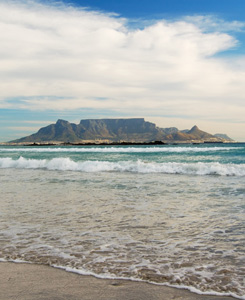Cape Town Weather
"Aren't you going to take a coat?" a friend asks me as we rush out the door to attend a charity event in Cape Town's lush Kirstenbosch Botanical Gardens. Although the sky is clear and the sun is shining, in Cape Town this is no simple question. Situated between two oceans, and languishing in the shadow of Table Mountain, the Mother City consistently confounds meteorological attempts to predict her weather. The Crowded House song "Four Seasons in one Day" is a rather apt description of the ever-shifting set of microclimates that is the Cape Town weather.


Nestled between the Indian and Atlantic oceans, Cape Town has a temperate, Mediterranean climate. Although September 1st is officially the first day of spring, things really only start to hot up toward the end of the month when clear skies and balmy temperatures provide a nice way to ease into the heat of summer. Summer brings sunshine and maximum temperatures of between 19-35 degrees Celsius which, when combined with the rich natural environment, make Cape Town the perfect place for film-crews and bevies of beautiful models to film and be filmed.
The Cape Town summer season, starting in October and peaking over the December - January period, is when things really hot up, with everybody from movie stars to international politicians descending on the city of Cape Town to enjoy the summer heat. February is generally considered the hottest month, with temperatures as high as 40 having been recorded and the heat, along with frenetic buzz tends to die down around April.
The South easterly wind - the famous "Cape Doctor", named for it's ability to cleanse Cape Town's air, can sometimes provide a challenge to outings to the beach. Ill-prepared beach goers can regularly be seen chasing umbrellas determined to find their freedom down the beach. The locals know which Cape Town beaches provide shelter; so don't forget to ask where to go if the wind seems a little brisk. Despite its ability to upset beach-goers, the ‘Cape Doctor’ is something of a boon to the Xtreme sports scene. Cape Town boasts a long history of sailing, windsurfing and kite surfing as part of its sporting heritage as well as hosting the Cape Town International Kite Festival in Muizenberg, which annually pays tribute to the Cape winds.
Winter in Cape Town is relatively mild, with July considered the coldest month having an average daily minimum temperature of 7 degrees Celsius. Despite it’s reputation as a summer hot spot, Cape Town also has an active winter social scene. Many bars and Cape Town restaurants provide rustic winter fires and ample opportunity to watch the clear winter night sky. It is also known to snow in Ceres, a rural hamlet outside of Cape Town in the Western Cape, and locals and tourists alike commute out of the city to take part in the African novelty of snowball fights and snowman building. Only very rarely in winter does it snow on Table Mountain, and when it does you feel it, with temperatures as low as -1 degree Celsius claiming an icy grip on the city. Rainfall tends to reach a peak in June/July although periods of rainfall often continue into September and October.













